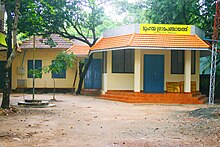| This article is part of a series on the |
| Politics of India |
|---|
 |
|
|

Panchayati raj (council of five officials) is the system of local self-government of villages in rural India[1] as opposed to urban and suburban municipalities.
It consists of the Panchayati Raj Institutions (PRIs) through which the self-government of villages is realized.[2] They are tasked with "economic development, strengthening social justice and implementation of Central and State Government Schemes including those 29 subjects listed in the Eleventh Schedule."[2]
Part IX of the Indian Constitution is the section of the Constitution relating to the Panchayats.[3][4] It stipulates that in states or Union Territories with more than two million inhabitants there are three levels of PRIs:
- the gram panchayat at village level
- the panchayat samiti (block samiti, mandal parishad) at block level, and
- the zilla panchayat (district council) at district level.[2]
In states or Union Territories with less than two million inhabitants there are only two levels of PRIs. The Gram Panchayat consists of all registered voters living in the area of a Gram Panchayat and is the organization through which village inhabitants participate directly in local government. Elections for the members of the Panchayats at all levels take place every five years. By federal law, the Panchayats must include members of Scheduled Castes (SCs) and Scheduled Tribes (STs) in the same proportion as in the general population and at least one-third of all seats and chairperson posts must be reserved for women. Some states have increased the required minimum proportion for women to one-half.[2]
Jawaharlal Nehru inaugurated Panchayat at Nagaur on 2 October 1959. The day was selected on the occasion of Mahatma Gandhi's birthday. Gandhi wanted Gram Swaraj through Panchayati Raj.[5][6] The system was modified in 1992 with the 73rd constitutional amendment.[7][8][9]
In India, the Panchayati Raj now functions as a system of governance in which gram panchayats are the basic units of local administration. Currently, the Panchayati Raj system exists in all states except Nagaland, Meghalaya, and Mizoram, and in all Union Territories except Delhi.[10]
- ^ "Panchayati Raj Institutions in India". India.gov.in.
- ^ a b c d "Basic Statistics of Panchayati Raj Institutions" (PDF). Ministry of Panchayati Raj. 2019. Archived (PDF) from the original on 7 April 2024. Retrieved 28 October 2020.
- ^ Renukadevi Nagshetty (2015). "IV. Structure and Organisational Aspects of Panchayati Raj Institutions in Karnataka and Gulbarga District". Problems and Challenges in the Working of Panchayat Raj Institutions in India. A Case Study of Gulbarga Zilla Panchayat (PhD). p. 93. hdl:10603/36516. Archived (PDF) from the original on 13 October 2017. Retrieved 28 October 2020.
- ^ "Record of Proceedings. Writ Petition (Civil) No. 671/2015" (PDF). Website "India Environment Portal" by the Centre for Science and Environment. Supreme Court of India. 2015. p. 3. Archived (PDF) from the original on 28 October 2020. Retrieved 28 October 2020.
- ^ Sharma, Shakuntla (1994). Grass Root Politics and Panchayati Raj. Deep & Deep Publications. p. 131.
- ^ Singh, Surat (2004). Decentralised Governance in India: Myth and Reality. Deep & Deep Publications. p. 74. ISBN 978-81-7629-577-2.
- ^ "Structure of Rural Local Government of India". Retrieved 3 January 2022.
- ^ Cite error: The named reference
Singh 2003was invoked but never defined (see the help page). - ^ "Living in the villages | D+C - Development + Cooperation". 12 February 2013.
- ^ Today, Telangana (22 February 2024). "Opinion: Make Panchayats more effective". Telangana Today. Retrieved 26 June 2024.